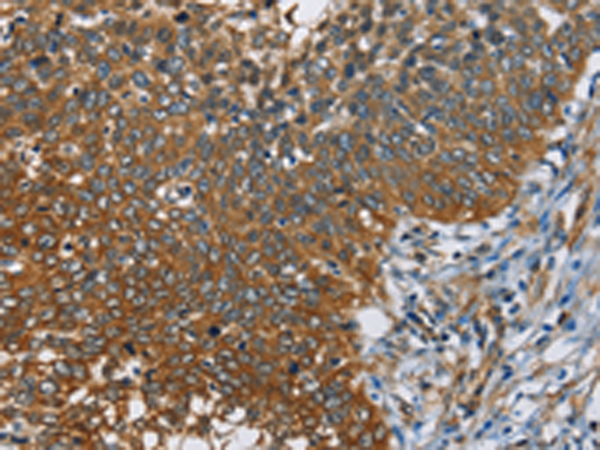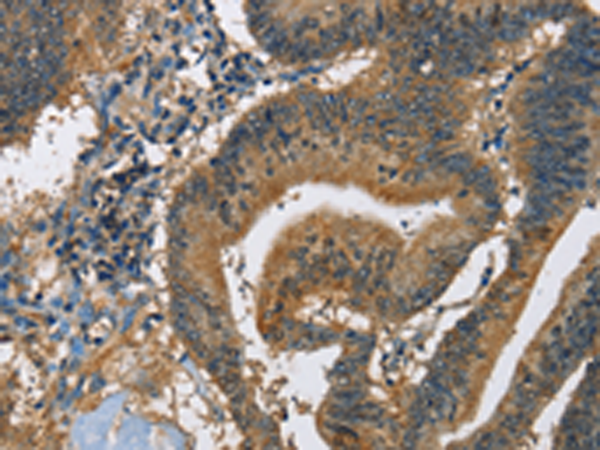


| WB | 咨询技术 | Human,Mouse,Rat |
| IF | 咨询技术 | Human,Mouse,Rat |
| IHC | 咨询技术 | Human,Mouse,Rat |
| ICC | 1/50-1/200 | Human,Mouse,Rat |
| FCM | 咨询技术 | Human,Mouse,Rat |
| Elisa | 咨询技术 | Human,Mouse,Rat |
| Aliases | BS-17 |
| WB Predicted band size | 77 kDa |
| Host/Isotype | Rabbit IgG |
| Antibody Type | Primary antibody |
| Storage | Store at 4°C short term. Aliquot and store at -20°C long term. Avoid freeze/thaw cycles. |
| Species Reactivity | Human |
| Immunogen | Fusion protein of human CAST |
| Formulation | Purified antibody in PBS with 0.05% sodium azide and 50% glycerol. |
+ +
以下是关于RPA70抗体的3篇代表性文献的简化信息(注:文献信息为示例性概括,实际引用需核实原文):
---
1. **文献名称**: "RPA70 Antibody Characterization in DNA Damage Response Studies"
**作者**: Fan J. et al.
**摘要**: 研究通过免疫沉淀和免疫印迹验证了RPA70抗体的特异性,发现其在检测DNA损伤诱导的RPA复合体核定位中具有高灵敏度,证实了RPA70在DNA修复通路中的核心作用。
---
2. **文献名称**: "Expression Analysis of RPA70 in Breast Cancer Using Monoclonal Antibodies"
**作者**: Smith L.M. et al.
**摘要**: 利用商业化RPA70抗体对乳腺癌组织进行免疫组化分析,结果显示RPA70高表达与基因组不稳定性及患者预后不良显著相关,提示其作为潜在生物标志物的价值。
---
3. **文献名称**: "Phosphorylation-Specific Antibody Reveals RPA70 Functional Dynamics"
**作者**: Jones R.K. et al.
**摘要**: 开发了一种针对RPA70磷酸化位点的抗体,发现该抗体可特异性识别DNA损伤后RPA70的修饰状态,为研究RPA复合体在细胞周期调控中的功能提供了新工具。
---
**提示**:实际研究中建议通过PubMed或Google Scholar以“RPA70 antibody”及研究关键词(如“DNA repair”“cancer”)检索最新文献,并优先选择高影响力期刊(如《Nucleic Acids Research》《Cell Reports》)的论文以确保可靠性。
The RPA70 antibody is a crucial tool in molecular biology research, targeting the 70 kDa subunit of Replication Protein A (RPA), a single-stranded DNA (ssDNA)-binding complex essential for DNA metabolism. RPA, composed of RPA70 (RPA1), RPA32 (RPA2), and RPA14 (RPA3), plays central roles in DNA replication, repair, recombination, and damage response. The RPA70 subunit contains conserved domains responsible for ssDNA binding and interactions with repair proteins like ATRIP in the ATR-mediated checkpoint pathway.
Antibodies against RPA70 are widely used to study DNA replication stress, genome stability, and cellular responses to DNA damage (e.g., from radiation or chemotherapy). They enable detection of RPA complex localization, dynamics, and post-translational modifications (e.g., phosphorylation during replication stress) via techniques like Western blotting, immunofluorescence, and immunoprecipitation. Researchers also employ these antibodies to investigate diseases linked to RPA dysfunction, such as cancer, where RPA overexpression correlates with genomic instability and poor prognosis.
Commercial RPA70 antibodies are typically raised in rabbits or mice, with validation across species (human, mouse, rat). Specificity is critical due to structural similarities among RPA subunits. Proper controls, like siRNA knockdown, are recommended to confirm target specificity in experimental settings.
×